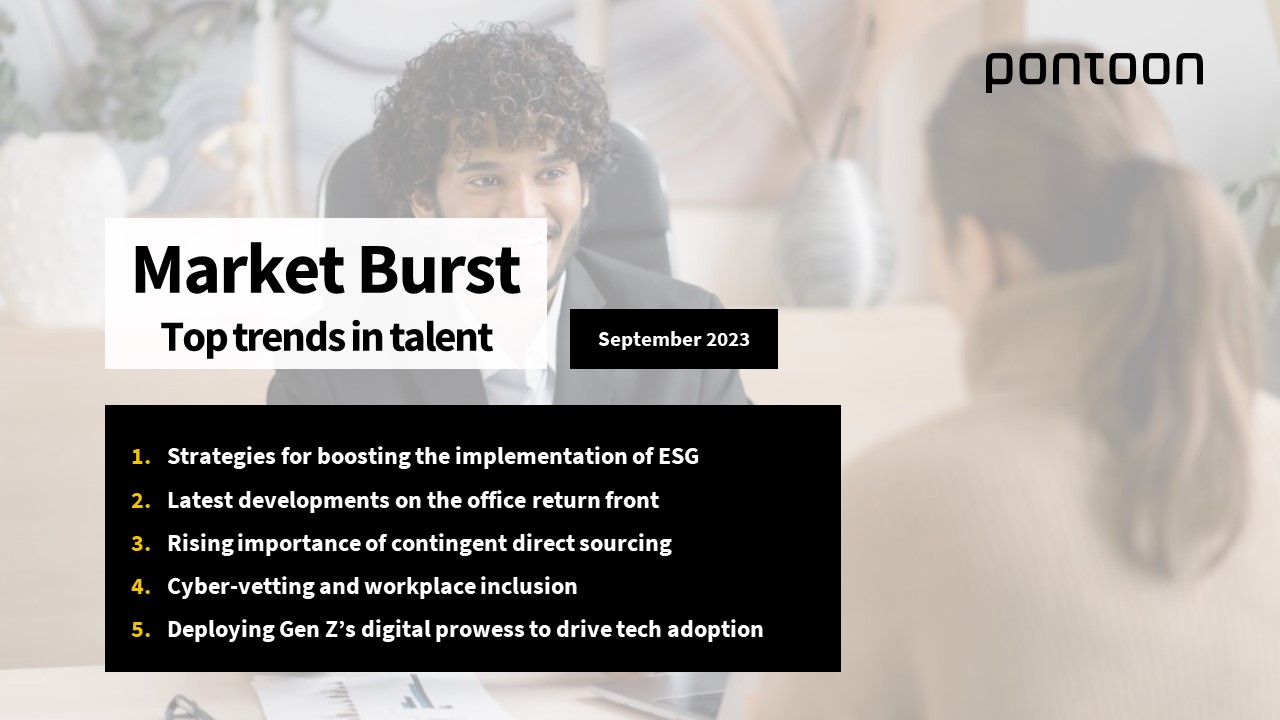Market Burst: September 2023
Read about top trends in the world of work.
In this month’s instalment of our Market Burst, we dive into the trends that continue to drive talent management in the evolving workspace. These include the rising importance of contingent direct sourcing, cyber-vetting, latest developments on the office return front, and more.
Strategies for boosting the implementation of ESG
Amid increasing attention placed on the contribution of businesses towards environmental and social progress, numerous companies are adopting sustainable business strategies as crucial imperatives. Still, according to the Pontoon Instinct and AXA Climate Snapshot Survey 2023, only 21% of leading ESG practitioners are satisfied with their company’s investment in ESG to deliver on their organisation’s commitment. In addition, 4 in 10 respondents would like more budget allocation and increased executive buy-in.
When asked to identify barriers to accelerating the adoption of ESG strategies, 29% of survey participants pointed to the need for insights and thought leadership, noting a lack of shared outcomes and reporting accountability. Nearly 2 in 10 said the suboptimal design of value-based tools and programmes is a significant roadblock, while 12% pointed to insufficient sponsorship from company leaders. On the back of these findings, some immediate solutions emerge:
- Establishing clear ESG goals and enhancing reporting. Companies should establish well-defined ESG objectives and focus on transparently communicating their performance, thereby fostering trust and credibility among stakeholders. This might involve creating comprehensive sustainability reports.
- Engaging the workforce and boosting their ESG commitment. Businesses must grasp the expectations and priorities of their employees and incorporate their insights into the ESG strategy. Companies should also encourage their staff to contribute innovative ideas and continuously expand their knowledge – for instance, through collaborative workshops involving NGOs, academia, and governmental bodies.
- Executive buy-in. Leaders should grasp the significance and value of ESG, taking an active role in advocating for its seamless integration into the firm’s strategy and day-to-day operations.
“You need to think how to promote your sustainability strategy among newcomers – there’s an employer branding focus. Another thing we cannot omit is the fact that there are more and more environmentally engaged employees – how my organisation adapts to that?”
Antoine Poincare (AXA Climate School) in conversation with Freddy Otto (Pontoon Instinct)
For a full version of Antoine and Freddy’s interview, please follow along here.
Latest developments on the office return front
Many companies continue mandating return to office policies. One notable recent example is Zoom, which has told employees to work on the firm’s premises at least twice a week. The decision raised some eyebrows, as Zoom enabled work from home for many people during and after the pandemic.
Meanwhile, a recent study revealed that companies adopting a “fully flexible” remote work policy experienced an average growth in headcount of 1.9%. This contrasts with a more modest increase of 0.8% at firms enforcing mandatory full-time in-office work. The numbers suggest that the workforce’s appetite for remote employment remains strong, which gives companies that offer virtual jobs an advantage of hiring faster. Interestingly, in another survey, nearly 6 in 10 individuals agreed that the most significant benefit of remote working is the flexibility to perform tasks when they feel most productive, with the convenience of limited commute and cost savings far behind.
Forcing return mandates can backfire through decreased retention and challenging talent attraction. On the other hand, the detrimental effects of fully remote setups, such as accelerated burnout, come to light. There is no single correct solution, and organisations should actively listen to the needs of their people and integrate them into company policies.
Rising importance of contingent direct sourcing
Amidst the widespread talent shortages spanning various industries, organisations worldwide are delving into less conventional routes to tap into talent pools. This includes the adoption of contingent direct sourcing methods.
A recent update from Staffing Industry Analysts highlighted that 52% of Managed Service Providers (MSP) anticipate a forthcoming surge in their direct sourcing initiatives. At Pontoon, we align with this trend, continuously developing our Pontoon Direct offering. Enabled through sourcing experts distributed across our Global Delivery Network, this solution brings numerous benefits to the clients, including:
- Casting a wider talent net gives access to underutilised candidates, including alumni, silver medallists, referrals, or redeployed workers.
- Proactive sourcing from a client-branded talent pool speeds up hiring.
- Being in direct communication with candidates improves their experience but also enhances the quality of shortlisted talent.
- Building relations with applicants fosters employer brand loyalty, resulting in more engaged workers who stay with the company for longer.
Read more on contingent direct sourcing from Hitomi Sakuragi, Pontoon’s Global Product Manager.
Cyber-vetting and workplace inclusion
Cyber-vetting is a practice where employers check applicants’ online presence to assess their suitability for a position. While this method provides insights into candidate behaviour, it has also raised concerns about potential discrimination against individuals from diverse backgrounds and those with disabilities.
Cyber-vetting goes beyond evaluating professional qualifications and skills, often delving into candidates’ lives, including their lifestyle choices and social interactions. Scholars warn that employers may reject applicants based on their perceived lifestyle, which can be linked to factors outside of the candidates’ control, such as upbringing, social background, and family influences. As such, cyber-vetting can result in hiring discrimination.
Companies should strike a balance between leveraging technology and ensuring fairness in the cyber-vetting process. AI-driven recruitment tools need continuous assessment for algorithmic fairness to prevent the exclusion of applicants from disadvantaged backgrounds. Moreover, accessible recruitment practices should be in place to accommodate individuals with disabilities. For instance, gamification should be used cautiously, considering potential disadvantages for candidates with certain medical conditions.
While cyber-vetting is a valuable tool, it comes with significant responsibilities. Business leaders and talent providers must embrace these solutions to build diverse and equitable workforces, ensuring fair opportunities for all applicants.
Deploying Gen Z’s digital prowess to drive tech adoption
Most Gen Zers finished their education and started careers amidst a global pandemic. Deprived of face-to-face interactions with experienced colleagues, they faced challenges when developing valuable skills, especially soft ones that require direct collaboration and human connection.
However, this group possess a significant advantage over senior coworkers – a natural aptitude for technology. Gen Z’s digital prowess can help disperse concerns surrounding AI and drive its adoption. Experts predict that by 2025, 53% of US Gen Zers will be monthly generative AI users, compared to 35% of Gen X and 16% of Baby Boomers. How can organisations capitalise on Gen Z’s natural immersion in the digital realm, considering that AI solidifies its position as a cornerstone of the contemporary work landscape? Here are just a few possible strategies:
- Young workers can get involved, if not lead, the efforts to find ways where AI can automate repeatable elements of jobs, optimise workflows, and increase productivity.
- Gen Zers can also be engaged in technology implementations where they can explain tools’ benefits and lay out their specifics to senior colleagues to help fight digital resistance.
- Considering their value-driven approach to work, younger generations can be vital in shaping ethical AI practices.
- Gen Z can also get involved in regular reverse mentorship schemes to help close tech skill gaps across the workforce.
“I think the current challenge with youth unemployment is that sometimes an intern or grad is seen as a continuous improvement for a business, as a value-type addition rather than a necessity. Whereas I’ve always seen early careers as the bedrock, the foundation of a business.”
Dan Crerand (Adecco Group’s CEO for One Month) in conversation with Shannon Robertson (Pontoon Instinct)
For a full version of Dan and Shannon’s interview, please follow along here – Part 1 and Part 2.
Related Post
Read about top trends in the world of work.
In this month’s instalment of our Market Burst, we dive into the trends that continue to drive talent management in the evolving ...





